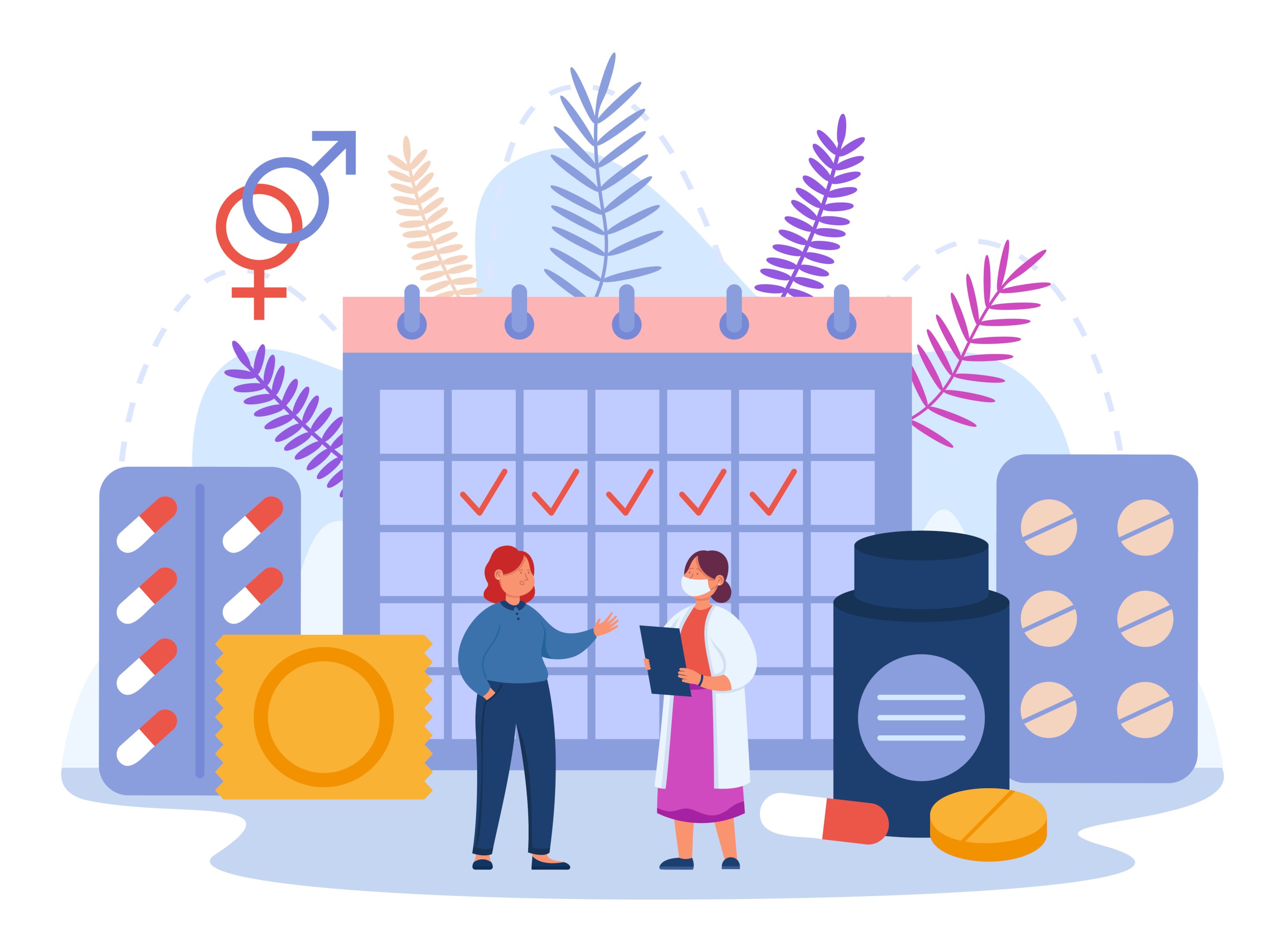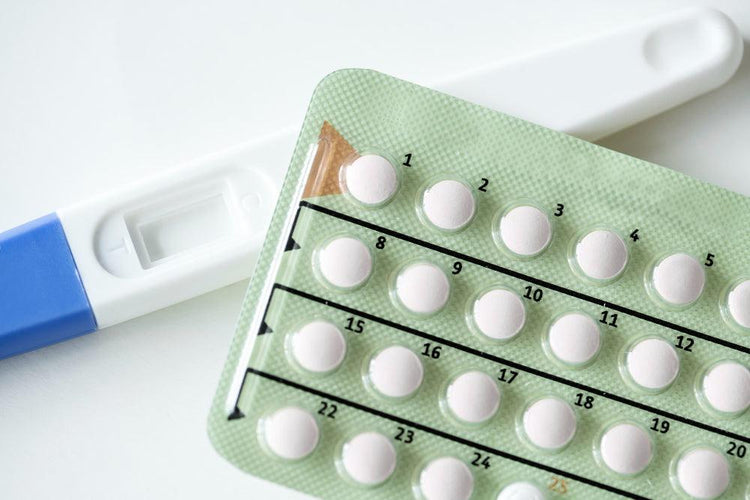
 Instagram
Instagram
Are birth control pills safe in the long run?


Related products
What’s covered?
Everything you need to know before a long-term contraceptive plan.

The alarming growth rate of the world population and decreasing per capita availability of resources have forced people and governments worldwide to promote population control measures. Two commonly used methods are male condoms and birth control pills. According to Statista, birth control pills constitute the most effective birth control method in the UK and are used by 28% of women aged 15-49 years, followed by a male condom (27%).
People choose different brands of birth control pills according to their likeness. In addition, the safety of these pills over the long term has long been widely debated. However, it would help if you first understood how these pills work before understanding their long-term safety.

How does a birth control pill work?
Birth control pills (also known as contraceptives) are taken orally and contain hormones. A birth control pill is advised to be taken daily without a single break and has shown 99% efficacy in preventing pregnancy, which is better than male condoms. Most of the combined oral contraceptives work by:
- Suppressing ovulation, (the release of ova from the ovary)
- Disturbing the development of the uterine wall. Due to this, the fertilised egg will not be able to attach to it.
- Causing a thickening of vaginal mucus. The sperm cells are usually deposited in the vagina, and they have to travel through the vaginal mucus to the ovarian duct (where the egg is present). A thickened mucus will not allow the sperms to pass.
What are the side effects of contraceptive pills?
The side effects of hormonal birth control pills could be categorised into two types, short-term and long-term.
Short term effects
These pills mostly contain artificial analogues of oestrogen or progesterone, the main hormones of the female reproductive system. Some pills use progesterone and oestrogen, while others only use progesterone (minipills, e.g., progestin-only pill). Progesterone prevents pregnancy, while oestrogen is added to reduce menstrual bleeding. As these hormones influence the reproductive organs, you may start noting some immediate side effects, while for some people, these effects appear only after some time. The side effects might include:
- Nausea
- Tenderness of breasts
- Bleeding (between periods)
- Mood swings
- Headaches
- Decreased libido
- Increase in the vaginal discharge
- High blood pressure
- Weight gain
- Exacerbation of any previous cardiovascular conditions (for combination pills)
However, these side effects disappear as their menstrual cycle adjusts to these hormones for most people. For successful birth control, habitual taking of the birth control pill is essential. First, however, your gynaecologist or general practitioner must be aware of any development.
Long-term side effects
These side effects depend upon whether you are taking these pills for contraception or treating medical conditions, e.g., endometritis, painful periods etc... Your gynaecologist should know the history of any side effects to give you proper advice. Some side effects noted while using these pills for long-term birth control are:
Blood clots
Some studies have shown that using oral contraceptives containing oestrogen and progesterone increases the risk of blood clot formation in the arteries. These clots may occlude the local arteries or travel downstream and lodge into the smaller arteries. Do you remember the 'pill scare' of 1995? The UK Committee on Safety Medicines issued a warning that oral contraceptives increase the chances of blood clots in the blood vessels. It caused fear in the users, and oral contraceptives in young women fell from 40-27%.
Another review study in 2013 found that people using oral contraceptives have a 3.5% more risk of developing blood clots (venous thrombosis) than non-users.
If the arteries supplying blood to your heart are occluded, you are at risk of heart attack or cardiac stroke. The chances increase significantly if you take medicines for blood pressure, are a smoker or have a vitamin K deficiency. Your physician may ask you to take some blood thinners with these contraceptives if you have a history of these complications.
Cancer
According to the National Cancer Institute, oral contraceptives increase breast and cervical cancer chances while reducing the risks of ovarian, colorectal and endometrial cancers. A 2004 study of data from 150,000 women in the Netherlands showed that oral contraceptive to avoid unintended pregnancy was associated with a 7% increase in breast cancer risk.
The cancer risk increases because contraceptives containing both oestrogen and progesterone stimulate the growth of cancer cells. The incidence of breast cancer has also been higher in people taking birth control pills, but this risk is reversible after stopping birth control pills. The pieces of evidence are, however, not uniform.
Risk of cardiovascular diseases
Don't forget to remind your gynaecologist about the condition of your heart. It would help them in choosing a suitable pill for you. There are nearly a million women in the UK who have heart disease, and still, many of these women take birth control pills to prevent pregnancy. However, since they are associated with increased blood pressure and blood clots, the drugs should be used cautiously with any health conditions.
Is it safe to take birth control pills for a long time?
The answer is never straightforward. Taking birth control pills may be safe for some people. However, some other people may experience a variety of health risks and increased risk of complications depending upon the health condition, medical history and age of the person using them. It is the job of your gynaecologist and you to find what suits you the best.
If you complain of clots, your physician can shift you towards the pills containing progesterone only. Even if this doesn't work, you can change to the non-hormonal version of intrauterine pregnancy control devices. In addition, if you have a family history of cancers, your family gynaecologist may ask you to adapt to non-hormonal contraceptives.
Bottom-line
Your healthcare provider will decide whether a contraceptive is safe or not. Talk to them frankly about your problems and needs. After considering all of the issues, your healthcare provider will choose the suitable method or combination of methods for you.
To view our range of Contraception Products, click here.
For a full range of blood tests and medications, visit our Welzo Online Pharmacy Page. For more details, click here.
Contraceptive pills & services
- Contraceptive treatment
- Buy rigevidon
- Buy Yasmin combined contraceptive
- Buy Cerazette
- Buy Mercilon
- Buy Cerelle
- Buy EllaOne emergency contraceptive
- Buy Triadene
- Buy Qlaira
- Buy Synphase
- Buy Sunya
- Buy Norgeston
- Buy Levonorgestrel
- Buy Ovranette
- Buy Femodette
- Buy Dretine
- Buy Levonelle
Contraception articles
- Is the morning after pill free?
- Can I get over the counter birth control pills?
- What are the benefits of the progesterone-only pill?
- What's The Difference Between The Combined Pill And The Mini Pill?
- When to take the morning-after pill?
- Natural Contraception Methods
- IUD Coils Explained
- Contraceptive vaginal rings explained
- What is a diaphragm contraceptive?
- What contraceptive is best for me?
- How does the contraceptive pill work?
- What is coil contraception?
- What are contraceptive injections?
- Is it safe to take contraceptives?
- What is the most effective form of contraception?
- Are contraceptive implants safe?
- Are birth control pills safe in the long run?























 Rated Excellent by 26,523+ Reviews
Rated Excellent by 26,523+ Reviews